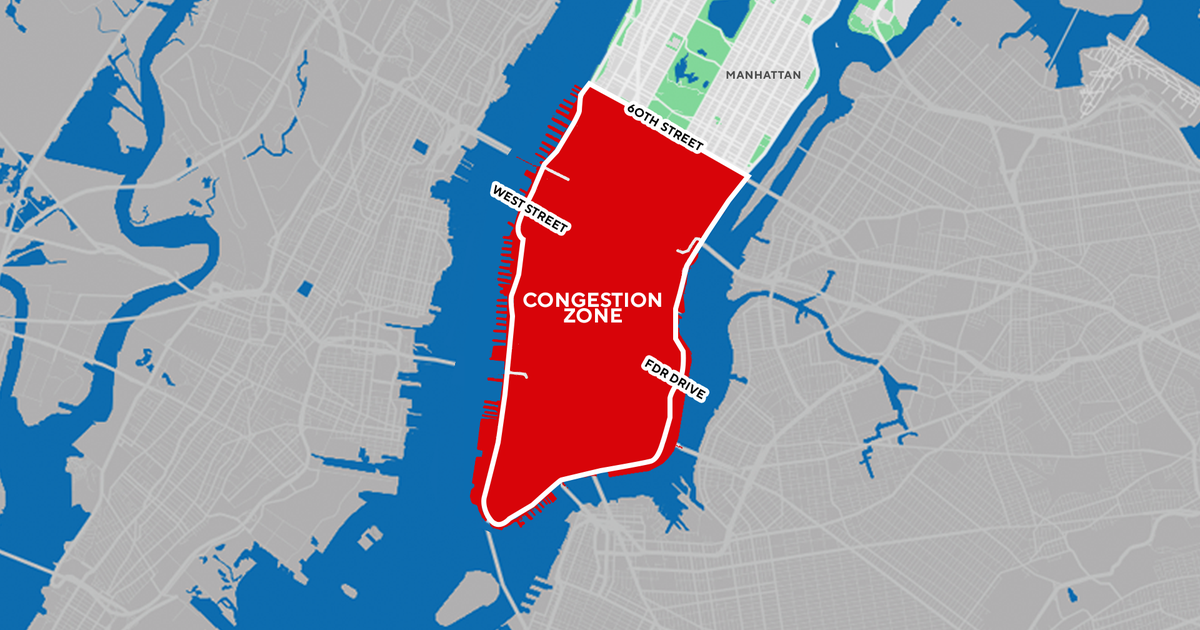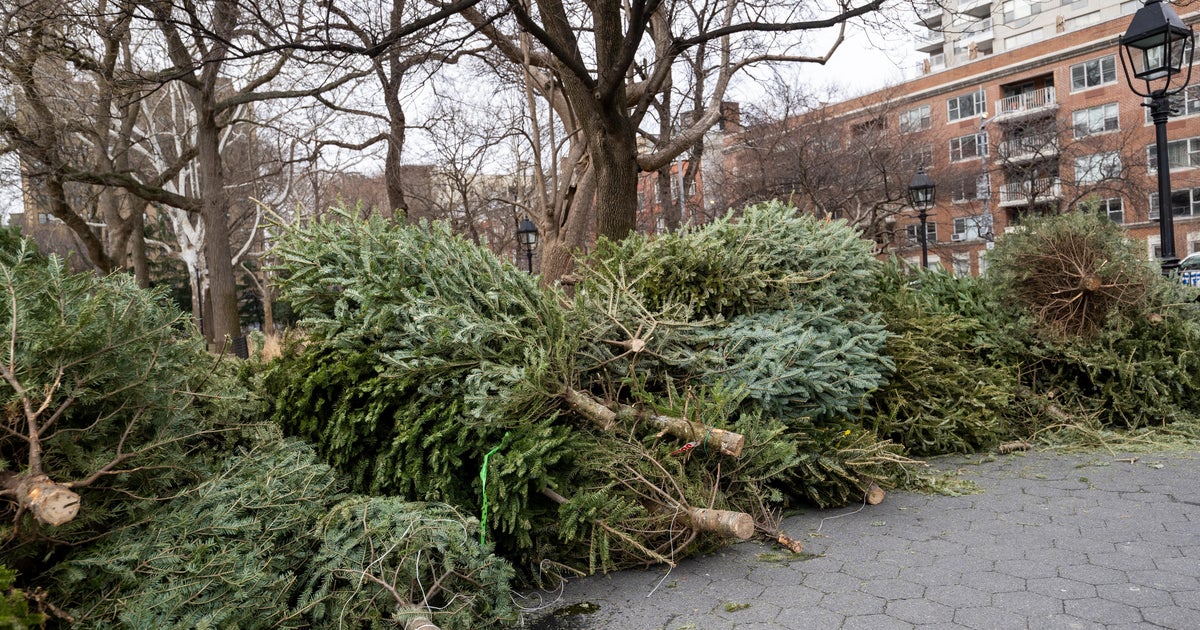Is NYC in for a "summer of hell" without congestion pricing? Here's what a transit official thinks.
NEW YORK -- Could the pause on New York City congestion pricing lead to another "summer of hell" for subway riders?
Richard Davey, the outgoing president of NYC Transit, is moving to Boston after more than two years on the job with the MTA. He was "shocked" when Gov. Kathy Hochul decided to put the brakes on the new tolls in Manhattan.
Davey appeared on Sunday's episode of "The Point with Marcia Kramer." Read a transcript of the interview below:
Fallout from congestion pricing pause
Marcia Kramer: Will Gov. Hochul's decision to pause congestion pricing lead to what some of the advocates are saying is another "summer of hell" for New York City Transit?
Richard Davey: I hope not. Certainly, obviously congestion pricing was about two things. One was the quality of life for New Yorkers, living in Manhattan certainly and around the region, but two it was also to continue to make investments in the transit system. It's doing OK, but the transit system is an old, creaky ... almost 120 years old. So there's still more investment that needs to happen and I hope the governor and the legislature figure it out. But it's not alarmist to say if it's not figured out in the near term, or even the medium term, then there could be challenges.
Kramer: So tell me what the challenges would be.
Davey: Well, think about the 7 line or the L line, right? Where we have modern signal systems, we have our highest customer satisfaction, the most reliable service because we've made those investments.
Kramer: But then you think about the Lexington Avenue Line ...
Davey: Yeah or the A, B, C, D, which typically are underperformers if you will. Now we have new cars going in on the A and the C, so we've seen improvement, but ...
Kramer: It needs new signals.
Davey: Yeah, it's not rocket science. The investment leads to reliability and some of these components are literally from the federal, from FDR's administration. His first term, by the way, as president. Not his last. So there's a lot of investment that needs to occur and they're going to have to find a way to make it up, no doubt.
Short and long term impact
Kramer: So let's talk about what could happen to the system short term and then long term. Short term, without the money from congestion pricing, what happens?
Davey: So Janno Lieber, who's the chair and CEO of MTA, my boss, has asked us to look at what the potential impacts are. Are there operating impacts, for example. We do have employees who work on both the capital and the operating budget, for example. If you don't have that capital dollars to justify part of their time, you're going to have to look at operations as an example. I think that's a potential reality.
Kramer: Are you talking about layoffs?
Davey: I'm not talking about layoffs, no. I think it could be slowing down hiring, for example. We still have a headcount at New York City Transit of about 47,000 employees. The budget's about 50,000. So, you want to get up to that level. I'm proud one of the things we've done in my two years is we've hired at record levels to make sure we've got bus operators, train operators and conductors out there, coming out of the pandemic. So I do worry a little about that, but time will tell if there's an operating budget impact.
Kramer: So I guess the question would be, in terms of having the program to install a new signaling system, which I think you would say is one of the most important things for the system, you could run trains closer together, more service, whatever. What's the impact of that program to fix the signals?
Davey: I think as your said, coming our of the summer of hell, that was 2017. The subway service was running at about 55, 60 percent on time, maybe. Last year, we had our best year ever. We were at 84, almost 84 percent on time.
Kramer: Which is something you did when you came here.
Davey: Yeah. And by the way April, in May, and into June we've seen real improvement as well. So I think keeping up that momentum with the investment both with the capital program, but the day-to-day maintenance that we're doing too, some of which is capitally funded is going to have to continue. But it's the track, it's the signal, I call it the unsexy stuff. You know, there's not a ribbon-cutting for a new switch or necessarily a signal system. Yeah new cars are exciting, Second Avenue subway, the extension will be cool, but there's a lot of other things that need to happen that I don't think folks realize.
Subway safety
Kramer: Are you worried about derailments, are you worried about slower service? Are you worried about, you know, there's more tourists taking the subways during the summer, is it going to be packed because you can't run trains closer together?
Davey: So I'm not worried about derailments. The system is safe, I want to be clear about that. As the city comes back from COVID, as it continues to grow, and you talked about weekend service. We actually continue to see growth in weekend service. So making sure, again, we have the reliability that's in place. And it doesn't flip overnight, right? The summer of hell, in 2017, was years of decline because there was a lack of maintenance. It's not as if because congestion pricing isn't coming on June 30, July 1 is going to be a disaster. Not at all. But, again, the heat needs to be put on folks to understand that the investment needs to occur, however it occurs, congestion pricing or other funding. That's not up to me, but you can see, I've seen this movie before. I've run other agencies in another state, Massachusetts, and lack of investment leads to these kinds of moments. By the way, the MBTA is going through this right now. There was a lack of maintenance and investments over the last few years. So it's just an obvious outgrowth if the investment doesn't happen.
Kramer: So what's the long term prognosis if there's no congestion pricing money.
Davey: If there's no congestion pricing money, as we've said, right now we have, it's just a math problem. So there are $28 billion worth of projects that are in this current capital program, and right now the MTA has $13 billion, about $14 billion, so ...
Kramer: Something's got to give.
Davey: Something's got to give and I think that's what Janno [Lieber] and the team are doing now to really look at. But safety critical projects will continue, but the the kind of progress that I anticipated I'd be leaving behind, is potentially in jeopardy.
A surprising decision?
Kramer: So were you surprised by this decision?
Davey: Yeah. Shocked. I was very surprised, didn't see it coming.
Kramer: You really didn't?
Davey: Nope.
Kramer: Do you but the argument that we're in an economic situation where inflation is hurting people and that they're not going to be able to afford to pay an extra $15?
Davey: So I don't, I'm not gonna say I buy that argument or not because I'm not talking to folks in that way. The folks that I talk to are customers. We're moving over 60 million customers a day at New York City Transit. Ninety percent of folks who come into the Central Business District, either for work or who live there by the way, are using mass transit. My two years here I lived in Hell's Kitchen. So I lived in the Central Business District. I talked to a lot of my neighbors who have said, particularly living around the Lincoln Tunnel, there's a lot of congestion in the neighborhood. And they saw this as an opportunity, less about funding for the MTA, but more about quality of life in the city. That's going to be lost at least for a period of time. I know there's a lot of disappointed folks.
Fare evasion
Kramer: So some have said that if you could solve the fare evasion problem, that would give you some $700 million that could be put back into the system. Why has that proved to be such a difficult problem to solve?
Davey: We need to do both. We need to continue to invest in the capital program. The fare evasion issues, for sure, we would continue to put into the operations and potentially add some more service. I think a couple things. I mean part of it's just behavior. And it's not just New York, it's other major urban transit systems around the United States who have had these challenges. I think certainly we weren't collecting fares for a period of time during COVID on buses, for example.
Kramer: So that gave people the idea that they could always come in the back door.
Davey: I think it gave people the idea, I think they got used to it a little bit. There are some other folks I think who have just sort of brazenly been, I mean fare evasion has always been around since the fare was collected. Certainly it's gotten worse in the last couple years. I also think too consequences is an issue. Not that I'm saying we need to criminalize fare evasion necessarily, but making sure that we're policing our system and there's order within our system, and I think that, COVID, maybe other administrations. You know this administration, Mayor [Eric] Adams in particular, [NYPD Transit] Chief [Michael] Kemper, they've been terrific working with us on crime and public safety. But we have work to do. I would say, I always have lots of regrets. Certainly one regret was not getting my arms around fare evasion on bus. I think that's going to be a real sticky challenge for the team going forward, but they've got some ideas to tackle it.
Why leave now?
Kramer: So what did you decide to leave?
Davey: It's a good question. I love this job. Personally, professionally it's a joy. New Yorkers have embraced this Bostonian, which I've appreciated. They haven't converted me into a sports fan, but they've embraced me. I had an opportunity to head back home, to work for a governor who I know and her team who I worked with in a previous administration. They have some of their own transportation challenges. Massport, the port authority, is not a turnaround, it's actually a really well run organization, it's about managing some growth there. And you're also at the, you're sort of at a point of transportation and economic development and I'm excited to sort of, have that part of my portfolio as well.
Kramer: So last question. Do you sort of regret the fact that one of the things you were unable to do was to rename Yankee Stadium Fenway South?
Davey: Yes, I was. You know even the bureaucracy at MTA will slow down a president's desire every one in a while. No, it's been a, really a wonderful two years. My second stint in New York. Who knows? Maybe I'd come back in the future. But I am grateful, deeply grateful, to Janno in particular, who I've known for a while and offered me this job, and the men and women who make me look good every day.
Kramer: Rich Davey, we've really profited from having you. Thank you for being on the show.
Davey: I appreciate that.
Click here to watch the full episode of "The Point with Marcia Kramer."




